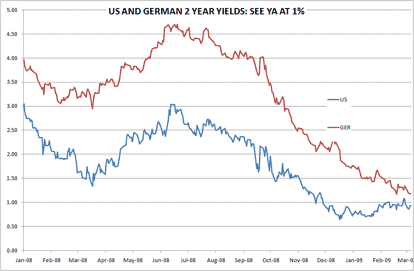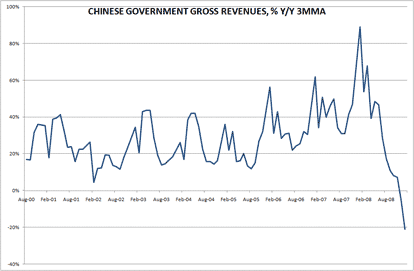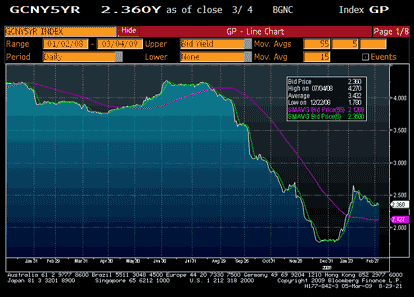Like Colt .45, it works every time! Macro Man points out that the market’s gone down pretty consistently and that there seems to be remarkably little panic, and whammo! Here’s a nice 2.4% rally to stick in your pocket.
But that was yesterday and this is today, which kicks off a pretty darned important 48 hours for financial markets. Chinese Premier Wen failed to deliver a hoped-for stimulus package in his keynote address to the NPC (more on this below), and tomorrow of course sees the release of US non-farm payrolls; Macro Man suspects that more than a few entries in office pools will be looking for seven-figure job losses.
But the real focus for the remainder of the day is the central bank announcements here in Europe. The ECB is widely expected to cut 0.50%, so focus will probably shift to the press conference, where JCT’s comments will be parsed for hints of further easing. Certainly it’s difficult to see the likely staff forecast downgrades standing in the way of taking rates down to 1%. That, at least, is what the bond market is saying; Schatz (German 2 year) yields appear to be in the grip of a Death Star-type tractor beam at 1%.
Even more interesting, perhaps, will be the Bank of England’s announcement, which could prove historic. Why? Because for all the talk of quantitative easing, and all the ink that’s been spilled over it, and indeed for all the central bank balance sheet expansion seen all over the world, no CB has actually formally adopted QE since the BOJ unwound it a few years ago. But perhaps the BOE will formally adopt it, in the sense of actually, you know, targeting some sort of quanitity. Whether they actually cut rates or not is largely academic; the market is expecting a 50 bps easing, but if policy is shifting to a quantitative asset-buying target, the level of base rates is largely irrelevant. Not that Macro Man wouldn’t welcome another half a percent off of his mortgage rate, however!
And now, China. Ever since the stimulus package was announced last November, there have been elements in the market that seem to have pinned their hopes of global recovery on a quick bounce in Chinese growth. The January rally in A shares is greeted with a fanfare, while the February sell-off is met with radio silence. The BDIY edges off the bottom of the chart, and this is seen as proof that things are picking up. The PMI bounces, and suspicions are “confirmed”; China is on the way back up.
Macro Man finds himself in a difficult position here. One of his relative investment advantages is being on top of the data, seeing second-derivative changes in important trends, and anticipating market sentiment shifts. This would appear to be a perfect set-up for him to go long oil and copper on the back of a Chinese recovery.
Yet he is best by nagging doubts…which are largely a function of the poor quality of Chinese data. How much can it really be believed? It is certainly true that the government has announced a program to increase domestic infrastructure spend, but it is not the case that this Y4 trillion will be completely accretive to growth; some, if not most, of it will be deployed away from other areas. Nevertheless, it is not a surprise to see some measures bounce.
But still, Macro Man has reservations. Bank lending surged last month…but we know that bank credit in China is administered via diktat, larging without consideration of the merits of the borrower. Anecdotal evidence from China (Michael Pettis is an excellent man-on-the-street source) suggests that a significant portion of this new lending was ploughed into….the stock market. While that may be swell if you’re invested in A shares, Macro Man isn’t quite clever enough to figure out how it benefits world growth in any meaningful way. Anecdotal evidence also suggests that Chinese firms badly overestimated deamnd for basic goods, and that domestic steel prices are falling as a result. What does that suggest about future commodity demand?
More generally, there seems to be a virtually unquestioning faith in certain quarters about the government’s ability to spend its way to its 8% growth target. Yet a simple analysis of what fiscal data is available suggests that this is nonsense. As mentioned above, the stimulus announced last November totalled Y4 trillion over the next couple of years. There was some suggestion that a new package of similar magnitude would be annoucned this morning. (It wasn’t.)
But on Macro Man’s readings of the data, there is just no way in hell that this is possible. Total central government revenues in 2007 were, accroding to Bloomberg Y5.1 trillion. The 2009 budget is forecast to run a deficit of roughly Y750 – 900 billion. That’s 3% of GDP. And while it is certainly possible to run a much bigger deficit than that (hey, just ask the West!), the Chinese government might be able to do just that without allocating a single new yuan towards stimulus. That’s because central government revenues are falling sharply, according to the monthly data available on Bloomberg.
So if revenues are falling and a big net spend is about to ensue….why, then the government must be about to adopt the Western model and increase borrowing very sharply. Given that the major buyers of government debt, the banks, have been increasing loan issuance instead…well, then surely Chinese yields must be ripping higher?
Uh…..no. While yields did rise in January, that appears to have been largely in synpathy with a global phenomenon (the “Barron’s bounce” for yields.) Since then, yields have been trickling lower, as the chart of the 5 year rate below demonstrates.
So if revenues are falling and local bond markets aren’t pricing in a big rise in borrowing, where’s the massive net stimulus going to come from?
Macro Man can only conclude that the answer is from the daydreams of the China bulls.






Leave a Reply